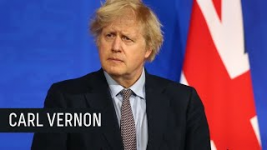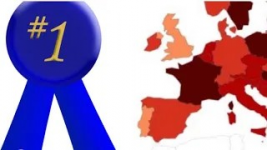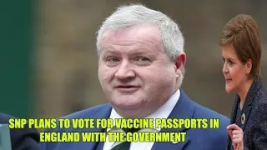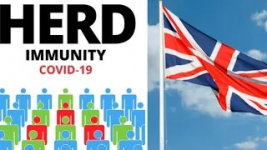COVID-19 'Pandemic'
- Thread starter Ocean Breeze
- Start date
You are using an out of date browser. It may not display this or other websites correctly.
You should upgrade or use an alternative browser.
You should upgrade or use an alternative browser.
A third of COVID survivors suffer neurological or mental disorders: Study
Author of the article:Reuters
Reuters
Kate Kelland
Publishing date:Apr 07, 2021 • 12 hours ago • 2 minute read • 10 Comments
A pedestrian wearing a face covering walks past a sign directing people to a rapid lateral flow COVID-19 testing centre at London Bridge train station in central London on April 5, 2021.
A pedestrian wearing a face covering walks past a sign directing people to a rapid lateral flow COVID-19 testing centre at London Bridge train station in central London on April 5, 2021. PHOTO BY TOLGA AKMEN /AFP via Getty Images
Article content
LONDON — One in three COVID-19 survivors in a study of more than 230,000 mostly American patients were diagnosed with a brain or psychiatric disorder within six months, suggesting the pandemic could lead to a wave of mental and neurological problems, scientists said on Tuesday.
Researchers who conducted the analysis said it was not clear how the virus was linked to psychiatric conditions such as anxiety and depression, but that these were the most common diagnoses among the 14 disorders they looked at.
Post-COVID cases of stroke, dementia and other neurological disorders were rarer, the researchers said, but were still significant, especially in those who had severe COVID-19.
“Although the individual risks for most disorders are small, the effect across the whole population may be substantial,” said Paul Harrison, a professor of psychiatry at Oxford University who co-led the work.
Advertisement
STORY CONTINUES BELOW
This advertisement has not loaded yet, but your article continues below.
Article content
Max Taquet, also an Oxford psychiatrist who worked with Harrison, noted that the study was not able to examine the biological or psychological mechanisms involved, but said urgent research is needed to identify these “with a view to preventing or treating them.”
Health experts are increasingly concerned by evidence of higher risks of brain and mental health disorders among COVID-19 survivors. A previous study by the same researchers found last year that 20% of COVID-19 survivors were diagnosed with a psychiatric disorder within three months.
The new findings, published in the Lancet Psychiatry journal, analyzed health records of 236,379 COVID-19 patients, mostly from the United States, and found 34% had been diagnosed with neurological or psychiatric illnesses within six months.
The disorders were significantly more common in COVID-19 patients than in comparison groups of people who recovered from flu or other respiratory infections over the same time period, the scientists said, suggesting COVID-19 had a specific impact.
Anxiety, at 17%, and mood disorders, at 14%, were the most common, and did not appear to be related to how mild or severe the patient’s COVID-19 infection had been.
Among those who had been admitted to intensive care with severe COVID-19 however, 7% had a stroke within six months, and almost 2% were diagnosed with dementia.
Independent experts said the findings were worrying.
“This is a very important paper. It confirms beyond any reasonable doubt that COVID-19 affects both brain and mind in equal measure,” said Simon Wessely, chair of psychiatry at King’s College London.
“The impact COVID-19 is having on individuals’ mental health can be severe,” said Lea Milligan, chief executive of the MQ Mental Health research charity. “This is contributing to the already rising levels of mental illness and requires further, urgent research.”
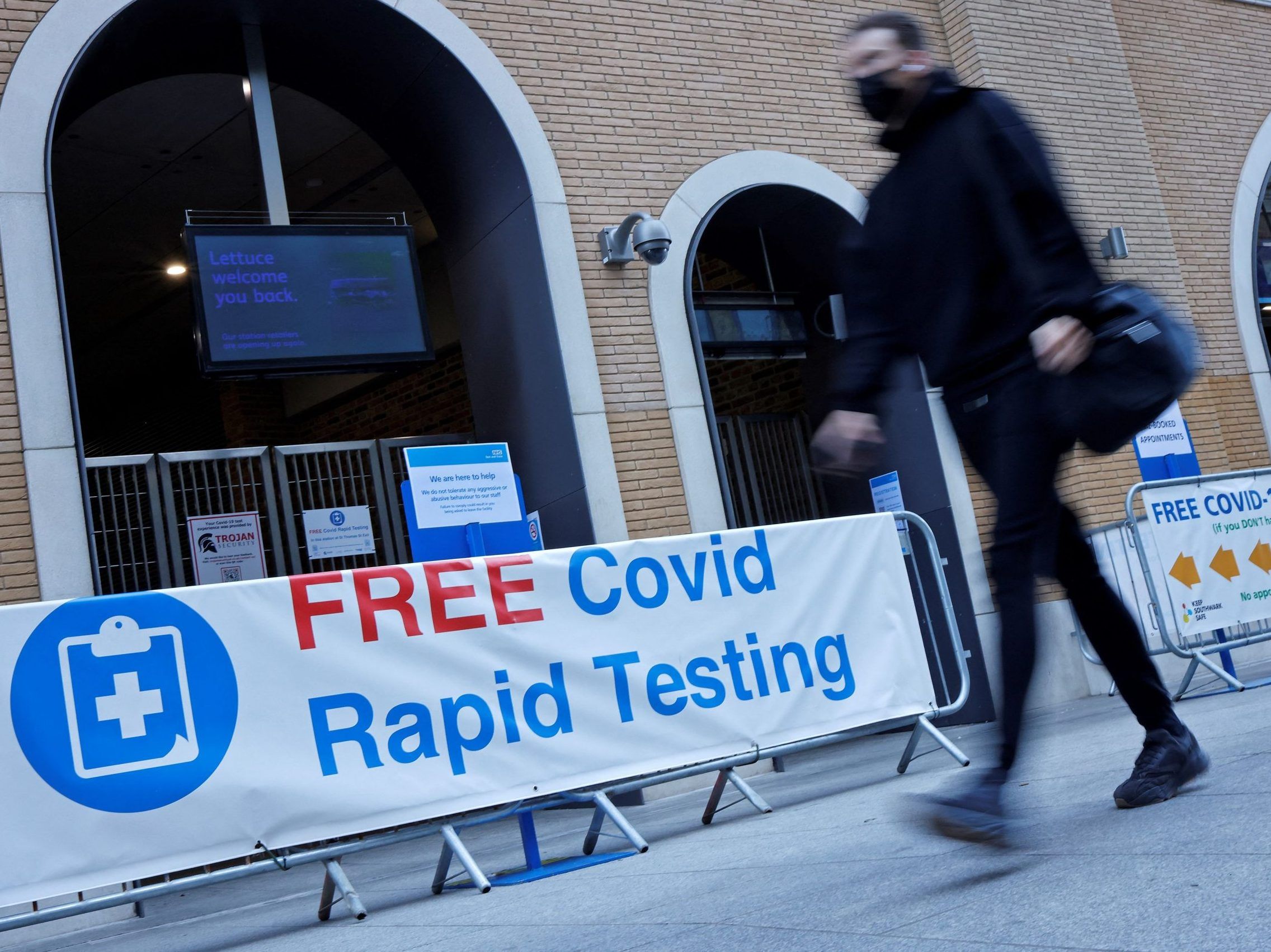
 torontosun.com
torontosun.com
Author of the article:Reuters
Reuters
Kate Kelland
Publishing date:Apr 07, 2021 • 12 hours ago • 2 minute read • 10 Comments
A pedestrian wearing a face covering walks past a sign directing people to a rapid lateral flow COVID-19 testing centre at London Bridge train station in central London on April 5, 2021.
A pedestrian wearing a face covering walks past a sign directing people to a rapid lateral flow COVID-19 testing centre at London Bridge train station in central London on April 5, 2021. PHOTO BY TOLGA AKMEN /AFP via Getty Images
Article content
LONDON — One in three COVID-19 survivors in a study of more than 230,000 mostly American patients were diagnosed with a brain or psychiatric disorder within six months, suggesting the pandemic could lead to a wave of mental and neurological problems, scientists said on Tuesday.
Researchers who conducted the analysis said it was not clear how the virus was linked to psychiatric conditions such as anxiety and depression, but that these were the most common diagnoses among the 14 disorders they looked at.
Post-COVID cases of stroke, dementia and other neurological disorders were rarer, the researchers said, but were still significant, especially in those who had severe COVID-19.
“Although the individual risks for most disorders are small, the effect across the whole population may be substantial,” said Paul Harrison, a professor of psychiatry at Oxford University who co-led the work.
Advertisement
STORY CONTINUES BELOW
This advertisement has not loaded yet, but your article continues below.
Article content
Max Taquet, also an Oxford psychiatrist who worked with Harrison, noted that the study was not able to examine the biological or psychological mechanisms involved, but said urgent research is needed to identify these “with a view to preventing or treating them.”
Health experts are increasingly concerned by evidence of higher risks of brain and mental health disorders among COVID-19 survivors. A previous study by the same researchers found last year that 20% of COVID-19 survivors were diagnosed with a psychiatric disorder within three months.
The new findings, published in the Lancet Psychiatry journal, analyzed health records of 236,379 COVID-19 patients, mostly from the United States, and found 34% had been diagnosed with neurological or psychiatric illnesses within six months.
The disorders were significantly more common in COVID-19 patients than in comparison groups of people who recovered from flu or other respiratory infections over the same time period, the scientists said, suggesting COVID-19 had a specific impact.
Anxiety, at 17%, and mood disorders, at 14%, were the most common, and did not appear to be related to how mild or severe the patient’s COVID-19 infection had been.
Among those who had been admitted to intensive care with severe COVID-19 however, 7% had a stroke within six months, and almost 2% were diagnosed with dementia.
Independent experts said the findings were worrying.
“This is a very important paper. It confirms beyond any reasonable doubt that COVID-19 affects both brain and mind in equal measure,” said Simon Wessely, chair of psychiatry at King’s College London.
“The impact COVID-19 is having on individuals’ mental health can be severe,” said Lea Milligan, chief executive of the MQ Mental Health research charity. “This is contributing to the already rising levels of mental illness and requires further, urgent research.”

A third of COVID survivors suffer neurological or mental disorders: Study
LONDON — One in three COVID-19 survivors in a study of more than 230,000 mostly American patients were diagnosed with a brain or psychiatric disorder within six mon…
Hospitals deploy artificial lungs, scramble for staff as COVID-19 hits younger patients
Author of the article:Reuters
Reuters
Anna Mehler Paperny and Allison Martell
Publishing date:Apr 06, 2021 • 1 day ago • 3 minute read • Join the conversation
A patient infected with COVID-19 is cared by extracorporeal membrane oxygenation in the COVID-19 reanimation unit at the AP-HP Georges Pompidou European Hospital in Paris, Tuesday, April 6, 2021.
A patient infected with COVID-19 is cared by extracorporeal membrane oxygenation in the COVID-19 reanimation unit at the AP-HP Georges Pompidou European Hospital in Paris, Tuesday, April 6, 2021. PHOTO BY ANNE-CHRISTINE POUJOULAT /AFP via Getty Images
Article content
TORONTO — Younger Canadians are bearing the brunt of the nation’s latest COVID-19 surge, creating growing demand for artificial lungs and a struggle to maintain staffing in critical care units as hospitals make last-ditch efforts to save patients.
Treatment with artificial lungs, known as extracorporeal membrane oxygenation, or ECMO, is much more likely to be deployed for patients under age 65, explained Marcelo Cypel, surgical director for the extracorporeal life support program at Toronto’s University Health Network (UHN).
Last week, there were a record 19 ECMO patients at UHN, 17 of them with severe COVID-19. When the sickest COVID-19 patients’ lungs fill with fluid and mechanical ventilators can no longer do the job, artificial lungs can save lives.
By Monday, doctors had weaned some off the machines and were down to 14 ECMO patients, 12 of them with COVID-19.
The need for these artificial lungs reflects a change in Canada’s epidemic, which has taken a turn for the worse, with new cases surging and outbreaks hitting workplaces and schools.
Advertisement
STORY CONTINUES BELOW
This advertisement has not loaded yet, but your article continues below.
Article content
With many seniors vaccinated and new, far more contagious coronavirus variants circulating widely, younger patients are increasingly arriving in intensive care.
“It’s very different now than the first wave, when we saw older people with comorbidities,” Cypel said. “We’re seeing more … young essential workers.”
The ECMO situation is under control for now, but things can change very quickly, Cypel cautioned.
When hospital systems in other countries were overwhelmed, they had to stop using ECMO because it requires a lot of staff – seven or more people to start the treatment.
About 55% of people who receive the therapy survive, Cypel said. However, they are often left with “severe physical limitations” from their extended hospital stay, he added.
Many of Canada’s provinces are in the grip of a worsening third COVID-19 wave, as they struggle to hasten vaccine rollouts. The country reported more than 6,200 new cases on Monday, with the percentage of people testing positive for the virus up to 3.8%.
In British Columbia, where hospitals are bracing for a surge in demand for intensive care unit (ICU) beds caused by the highly concerning P.1 virus variant first discovered in, and now ravaging, Brazil, critical care doctor Del Dorscheid from Vancouver’s St. Paul’s Hospital is more worried about staffing than artificial lung use.
On a given shift, he said, a third of the staff are working overtime.
“They’re working so hard to find bodies to fill those empty spots,” he said. “I wouldn’t say we’re seeing more mistakes. Not yet, anyways. But we are certainly seeing burnout.”
Advertisement
STORY CONTINUES BELOW
This advertisement has not loaded yet, but your article continues below.
Article content
For ICUs, there is no end in sight. As of Tuesday, there were 497 COVID-19 patients in Ontario’s ICUs, a new high. Last week, experts advising the provincial government said that could rise to 800 by the end of April even with a new stay-at-home order – or approach 1,000 without it. The province stopped short of a new stay-at-home order.
New restrictions implemented in Ontario last week change little for hardest-hit areas. In Toronto, patios for outdoor bars and restaurants closed, and a plan to reopen salons was shelved. On Monday, hard-hit Peel, west of Toronto, moved on its own to suspend in-person classes at schools for two weeks.
Canada’s vaccination rate has picked up after a slow start, with 15% of the population getting at least one shot. But data from the Institute for Clinical Evaluative Sciences shows that the Ontario communities at highest risk of COVID-19 transmission also have the lowest rates of vaccination.
These communities tend to have a high proportion of residents unable to work from home, many of them non-white immigrants holding down jobs at high risk of virus exposure.
Some lack cars to drive to vaccination sites or paid time off to get the vaccine, said Brampton doctor Amanpreet Brar. Some of the hardest-hit neighbourhoods lack pharmacies that dispense COVID-19 vaccines.
“It really reflects systemic inequities we see in our society,” said Brar. “They’re considered non-essential, while their work is considered essential.”
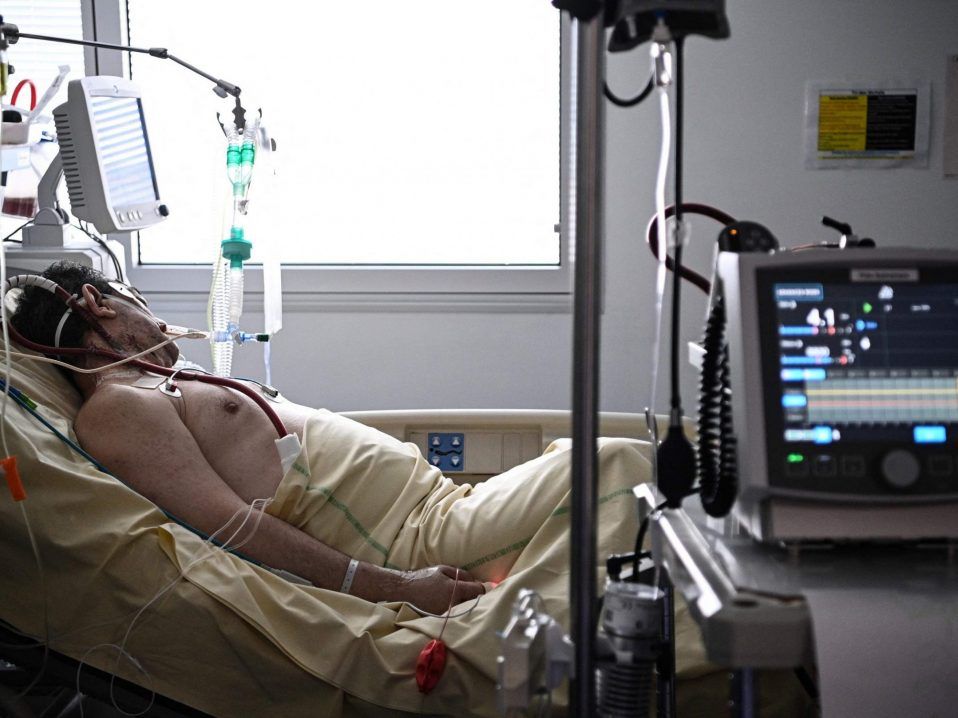
 torontosun.com
torontosun.com
Author of the article:Reuters
Reuters
Anna Mehler Paperny and Allison Martell
Publishing date:Apr 06, 2021 • 1 day ago • 3 minute read • Join the conversation
A patient infected with COVID-19 is cared by extracorporeal membrane oxygenation in the COVID-19 reanimation unit at the AP-HP Georges Pompidou European Hospital in Paris, Tuesday, April 6, 2021.
A patient infected with COVID-19 is cared by extracorporeal membrane oxygenation in the COVID-19 reanimation unit at the AP-HP Georges Pompidou European Hospital in Paris, Tuesday, April 6, 2021. PHOTO BY ANNE-CHRISTINE POUJOULAT /AFP via Getty Images
Article content
TORONTO — Younger Canadians are bearing the brunt of the nation’s latest COVID-19 surge, creating growing demand for artificial lungs and a struggle to maintain staffing in critical care units as hospitals make last-ditch efforts to save patients.
Treatment with artificial lungs, known as extracorporeal membrane oxygenation, or ECMO, is much more likely to be deployed for patients under age 65, explained Marcelo Cypel, surgical director for the extracorporeal life support program at Toronto’s University Health Network (UHN).
Last week, there were a record 19 ECMO patients at UHN, 17 of them with severe COVID-19. When the sickest COVID-19 patients’ lungs fill with fluid and mechanical ventilators can no longer do the job, artificial lungs can save lives.
By Monday, doctors had weaned some off the machines and were down to 14 ECMO patients, 12 of them with COVID-19.
The need for these artificial lungs reflects a change in Canada’s epidemic, which has taken a turn for the worse, with new cases surging and outbreaks hitting workplaces and schools.
Advertisement
STORY CONTINUES BELOW
This advertisement has not loaded yet, but your article continues below.
Article content
With many seniors vaccinated and new, far more contagious coronavirus variants circulating widely, younger patients are increasingly arriving in intensive care.
“It’s very different now than the first wave, when we saw older people with comorbidities,” Cypel said. “We’re seeing more … young essential workers.”
The ECMO situation is under control for now, but things can change very quickly, Cypel cautioned.
When hospital systems in other countries were overwhelmed, they had to stop using ECMO because it requires a lot of staff – seven or more people to start the treatment.
About 55% of people who receive the therapy survive, Cypel said. However, they are often left with “severe physical limitations” from their extended hospital stay, he added.
Many of Canada’s provinces are in the grip of a worsening third COVID-19 wave, as they struggle to hasten vaccine rollouts. The country reported more than 6,200 new cases on Monday, with the percentage of people testing positive for the virus up to 3.8%.
In British Columbia, where hospitals are bracing for a surge in demand for intensive care unit (ICU) beds caused by the highly concerning P.1 virus variant first discovered in, and now ravaging, Brazil, critical care doctor Del Dorscheid from Vancouver’s St. Paul’s Hospital is more worried about staffing than artificial lung use.
On a given shift, he said, a third of the staff are working overtime.
“They’re working so hard to find bodies to fill those empty spots,” he said. “I wouldn’t say we’re seeing more mistakes. Not yet, anyways. But we are certainly seeing burnout.”
Advertisement
STORY CONTINUES BELOW
This advertisement has not loaded yet, but your article continues below.
Article content
For ICUs, there is no end in sight. As of Tuesday, there were 497 COVID-19 patients in Ontario’s ICUs, a new high. Last week, experts advising the provincial government said that could rise to 800 by the end of April even with a new stay-at-home order – or approach 1,000 without it. The province stopped short of a new stay-at-home order.
New restrictions implemented in Ontario last week change little for hardest-hit areas. In Toronto, patios for outdoor bars and restaurants closed, and a plan to reopen salons was shelved. On Monday, hard-hit Peel, west of Toronto, moved on its own to suspend in-person classes at schools for two weeks.
Canada’s vaccination rate has picked up after a slow start, with 15% of the population getting at least one shot. But data from the Institute for Clinical Evaluative Sciences shows that the Ontario communities at highest risk of COVID-19 transmission also have the lowest rates of vaccination.
These communities tend to have a high proportion of residents unable to work from home, many of them non-white immigrants holding down jobs at high risk of virus exposure.
Some lack cars to drive to vaccination sites or paid time off to get the vaccine, said Brampton doctor Amanpreet Brar. Some of the hardest-hit neighbourhoods lack pharmacies that dispense COVID-19 vaccines.
“It really reflects systemic inequities we see in our society,” said Brar. “They’re considered non-essential, while their work is considered essential.”

Hospitals deploy artificial lungs, scramble for staff as COVID-19 hits younger patients
TORONTO — Younger Canadians are bearing the brunt of the nation’s latest COVID-19 surge, creating growing demand for artificial lungs and a struggle to maintain sta…
Younger, healthier people need intensive care quickly with variants of COVID-19: Tam
Author of the article:Canadian Press
Canadian Press
Mia Rabson
Publishing date:Apr 06, 2021 • 1 day ago • 4 minute read • 10 Comments
Chief Public Health Officer Dr. Theresa Tam attends a news conference in Ottawa, March 23, 2020.
Chief Public Health Officer Dr. Theresa Tam attends a news conference in Ottawa, March 23, 2020. PHOTO BY BLAIR GABLE /REUTERS / FILES
Article content
OTTAWA — Provincial governments are grappling with how to bring the third wave of COVID-19 under control, as the more virulent variants of the virus begin to dominate and younger, healthier people are getting very sick, very quickly.
From Ontario and Quebec to British Columbia and Alberta, fear of the variants is growing as swiftly as the caseloads, particularly for young people who might still think the virus won’t hit them that hard.
“This is a reminder that COVID-19 can impact people of all ages, and severe illness can occur at any age,” said Dr. Theresa Tam, Canada’s chief public health officer.
Provincial health officials report increasing numbers of hospital admissions of younger patients who soon need intensive care, she said Tuesday. “Many of them deteriorate quite quickly and have to be admitted to the ICU.”
Tam said there were on average 6,100 new cases of COVID-19 a day over the last week, and 31 deaths, up from 4,600 new cases and 26 deaths a week earlier.
Advertisement
STORY CONTINUES BELOW
This advertisement has not loaded yet, but your article continues below.
Article content
But the hospitalization numbers concern her the most, and the share of hospitalized patients who need critical care is growing fastest.
In the last week, the number of people in hospital with COVID-19 rose four per cent to an average of 2,400 people a day, she said. At the same time the number of people in ICU grew by 18 per cent to 780 people.
That means about one in every three patients hospitalized with COVID-19 now need critical care. In mid-January, when hospitalizations during the second wave of the pandemic peaked at 4,775, about one-fifth, or 880 people, were in the ICU.
Several jurisdictions are reporting that a majority of patients in hospital are under age 60, and physicians across the country are increasingly taking to social media to drive home this is not a virus that attacks just the weak or the old.
“Younger people think they are invincible,” tweeted Dr. Kevin McLeod, an internal medicine specialist in Vancouver. “That feeling quickly fades when we are blasting you with 100% oxygen … and all you really hear is a team debating pros and cons of intubating you and hooking you up to a ventilator.”
There is increasing pressure on provinces to get vaccines to younger, essential workers faster, in industries where it’s known the virus is spreading and workers can’t stay home.
Prime Minister Justin Trudeau was to speak to Ontario Premier Doug Ford Tuesday, with vaccines dominating the agenda. Trudeau said he would offer any needed assistance to Ford.
Advertisement
STORY CONTINUES BELOW
This advertisement has not loaded yet, but your article continues below.
Article content
Public sniping between Ontario and Ottawa over the vaccine supply and delivery grew in recent days with Ford blaming slow delivery of vaccines for uneven distribution, and federal Health Minister Patty Hajdu taking to Twitter to point out how many doses Canada had delivered versus how many provinces had injected.
Hajdu said Tuesday she was only offering up facts. About 6.7 million jabs have been administered, out of more than 10 million doses distributed. But as much as 15 per cent of those doses were received by provinces only in the last few days.
Canada was nearing the six million mark for the number of people vaccinated with at least one dose Tuesday afternoon.
Tam said vaccines are helping but warned they aren’t a panacea and, with the variants exploding, there is still a need to limit interactions and to wear masks.
There are more than 15,000 confirmed cases of variants in Canada, up from 9,000 on March 30. Positive cases are now screened for a variant but it then takes several days to identify which one it is.
Ontario has confirmed about 2,300 variant cases but has more than 27,000 cases screened and awaiting full sequencing.
More than 90 per cent of confirmed variant cases are the B.1.1.7, first identified in the United Kingdom. But the P.1 variant first identified in Brazil is also charging ahead quickly, particularly in British Columbia where 737 of the 857 P.1. cases in Canada have been confirmed.
Tam said chief public health officers from federal and provincial governments met over the weekend to discuss the P.1 spread, and are working to double efforts to manage known P.1 cases.
Advertisement
STORY CONTINUES BELOW
This advertisement has not loaded yet, but your article continues below.
Article content
Tam pushed again against Canadians travelling anywhere at the moment, be it internationally or within the country. Interprovincial travel is believed to have spread the P.1 variant between British Columbia and Alberta in recent weeks.
Lab studies suggest vaccines are less effective against this variant, she said.
Just days after invoking a provincewide “emergency brake,” Ontario Premier Doug Ford is pondering even more restrictions, pushed by local public health doctors in Ottawa and the Greater Toronto Area.
The province has not closed schools but local public health chiefs in Toronto, Peel and Wellington-Dufferin-Guelph ordered all schools closed until at least April 19.
Ontario reported more than 3,000 new cases for the fifth time in six days Tuesday, and provincial public health chief Dr. David Williams warned that number could rise dramatically following the Easter long weekend, when testing numbers were down and gatherings likely.
Quebec reported more than 1,000 cases for the seventh straight day Tuesday.
Citing a need to adapt to the more contagious variants, Quebec Premier Francois Legault announced more restrictions.
Beginning Thursday, gyms in the province’s red zones, including Montreal and its suburbs, will close, and places of worship will have to limit attendance to 25 people.
As of next Monday, students in the last three years of high school will attend class on alternate days, and extracurricular activities will be cancelled.

 torontosun.com
torontosun.com
Author of the article:Canadian Press
Canadian Press
Mia Rabson
Publishing date:Apr 06, 2021 • 1 day ago • 4 minute read • 10 Comments
Chief Public Health Officer Dr. Theresa Tam attends a news conference in Ottawa, March 23, 2020.
Chief Public Health Officer Dr. Theresa Tam attends a news conference in Ottawa, March 23, 2020. PHOTO BY BLAIR GABLE /REUTERS / FILES
Article content
OTTAWA — Provincial governments are grappling with how to bring the third wave of COVID-19 under control, as the more virulent variants of the virus begin to dominate and younger, healthier people are getting very sick, very quickly.
From Ontario and Quebec to British Columbia and Alberta, fear of the variants is growing as swiftly as the caseloads, particularly for young people who might still think the virus won’t hit them that hard.
“This is a reminder that COVID-19 can impact people of all ages, and severe illness can occur at any age,” said Dr. Theresa Tam, Canada’s chief public health officer.
Provincial health officials report increasing numbers of hospital admissions of younger patients who soon need intensive care, she said Tuesday. “Many of them deteriorate quite quickly and have to be admitted to the ICU.”
Tam said there were on average 6,100 new cases of COVID-19 a day over the last week, and 31 deaths, up from 4,600 new cases and 26 deaths a week earlier.
Advertisement
STORY CONTINUES BELOW
This advertisement has not loaded yet, but your article continues below.
Article content
But the hospitalization numbers concern her the most, and the share of hospitalized patients who need critical care is growing fastest.
In the last week, the number of people in hospital with COVID-19 rose four per cent to an average of 2,400 people a day, she said. At the same time the number of people in ICU grew by 18 per cent to 780 people.
That means about one in every three patients hospitalized with COVID-19 now need critical care. In mid-January, when hospitalizations during the second wave of the pandemic peaked at 4,775, about one-fifth, or 880 people, were in the ICU.
Several jurisdictions are reporting that a majority of patients in hospital are under age 60, and physicians across the country are increasingly taking to social media to drive home this is not a virus that attacks just the weak or the old.
“Younger people think they are invincible,” tweeted Dr. Kevin McLeod, an internal medicine specialist in Vancouver. “That feeling quickly fades when we are blasting you with 100% oxygen … and all you really hear is a team debating pros and cons of intubating you and hooking you up to a ventilator.”
There is increasing pressure on provinces to get vaccines to younger, essential workers faster, in industries where it’s known the virus is spreading and workers can’t stay home.
Prime Minister Justin Trudeau was to speak to Ontario Premier Doug Ford Tuesday, with vaccines dominating the agenda. Trudeau said he would offer any needed assistance to Ford.
Advertisement
STORY CONTINUES BELOW
This advertisement has not loaded yet, but your article continues below.
Article content
Public sniping between Ontario and Ottawa over the vaccine supply and delivery grew in recent days with Ford blaming slow delivery of vaccines for uneven distribution, and federal Health Minister Patty Hajdu taking to Twitter to point out how many doses Canada had delivered versus how many provinces had injected.
Hajdu said Tuesday she was only offering up facts. About 6.7 million jabs have been administered, out of more than 10 million doses distributed. But as much as 15 per cent of those doses were received by provinces only in the last few days.
Canada was nearing the six million mark for the number of people vaccinated with at least one dose Tuesday afternoon.
Tam said vaccines are helping but warned they aren’t a panacea and, with the variants exploding, there is still a need to limit interactions and to wear masks.
There are more than 15,000 confirmed cases of variants in Canada, up from 9,000 on March 30. Positive cases are now screened for a variant but it then takes several days to identify which one it is.
Ontario has confirmed about 2,300 variant cases but has more than 27,000 cases screened and awaiting full sequencing.
More than 90 per cent of confirmed variant cases are the B.1.1.7, first identified in the United Kingdom. But the P.1 variant first identified in Brazil is also charging ahead quickly, particularly in British Columbia where 737 of the 857 P.1. cases in Canada have been confirmed.
Tam said chief public health officers from federal and provincial governments met over the weekend to discuss the P.1 spread, and are working to double efforts to manage known P.1 cases.
Advertisement
STORY CONTINUES BELOW
This advertisement has not loaded yet, but your article continues below.
Article content
Tam pushed again against Canadians travelling anywhere at the moment, be it internationally or within the country. Interprovincial travel is believed to have spread the P.1 variant between British Columbia and Alberta in recent weeks.
Lab studies suggest vaccines are less effective against this variant, she said.
Just days after invoking a provincewide “emergency brake,” Ontario Premier Doug Ford is pondering even more restrictions, pushed by local public health doctors in Ottawa and the Greater Toronto Area.
The province has not closed schools but local public health chiefs in Toronto, Peel and Wellington-Dufferin-Guelph ordered all schools closed until at least April 19.
Ontario reported more than 3,000 new cases for the fifth time in six days Tuesday, and provincial public health chief Dr. David Williams warned that number could rise dramatically following the Easter long weekend, when testing numbers were down and gatherings likely.
Quebec reported more than 1,000 cases for the seventh straight day Tuesday.
Citing a need to adapt to the more contagious variants, Quebec Premier Francois Legault announced more restrictions.
Beginning Thursday, gyms in the province’s red zones, including Montreal and its suburbs, will close, and places of worship will have to limit attendance to 25 people.
As of next Monday, students in the last three years of high school will attend class on alternate days, and extracurricular activities will be cancelled.

Younger, healthier people need intensive care quickly with variants of COVID-19: Tam
OTTAWA — Provincial governments are grappling with how to bring the third wave of COVID-19 under control, as the more virulent variants of the virus begin to domina…
EMA official sees clear 'association' between AstraZeneca vaccine and rare blood clots in brain
Author of the article:Reuters
Reuters
Publishing date:Apr 06, 2021 • 1 day ago • 3 minute read • 14 Comments
A man, wearing a t-shirt with the logo of the Spanish National soccer team, receives his first dose of the AstraZeneca COVID-19 vaccine, at Enfermera Isabel Zendal hospital in Madrid, Spain, Tuesday, April 6, 2021.
A man, wearing a t-shirt with the logo of the Spanish National soccer team, receives his first dose of the AstraZeneca COVID-19 vaccine, at Enfermera Isabel Zendal hospital in Madrid, Spain, Tuesday, April 6, 2021. PHOTO BY SERGIO PEREZ /REUTERS
Article content
ROME — A senior official at Europe’s medicines regulator has said there is a clear “association” between AstraZeneca’s COVID-19 vaccine and very rare blood clots in the brain, though the direct cause of the clots is still unknown.
The European Medical Agency (EMA) said in a statement after the comments by Marco Cavaleri, chair of its vaccine evaluation team, that it was still conducting a review of the vaccine and expected to announce its findings on Wednesday or Thursday.
An AstraZeneca spokesman declined to comment on Cavaleri’s remarks, which he made in an interview with Italian newspaper Il Messagero that was published on Tuesday.
“In my opinion, we can now say it, it is clear that there is an association (of the brain blood clots) with the vaccine. However, we still do not know what causes this reaction,” Cavaleri said, without giving evidence to support his comments.
The EMA has said the benefits of the AstraZeneca shot outweigh any risks, and the World Health Organization has backed the vaccine. AstraZeneca has said previously that its studies have found no higher risk of clots because of its vaccine.
Advertisement
STORY CONTINUES BELOW
This advertisement has not loaded yet, but your article continues below.
Article content
The EMA is investigating 44 reports of an extremely rare brain clot known as cerebral venous sinus thrombosis (CVST) out of 9.2 million people who have received the vaccine in the European Economic Area, which comprises European Union member states and Iceland, Liechtenstein and Norway.
Cavaleri said the EMA would say in its review that there is a link, but was not likely to give an indication this week on which age groups should or should not get the AstraZeneca shot.
Some countries, including France, Germany and the Netherlands, have suspended the use of the vaccine in younger people while the investigations continue.
In response to Cavaleri’s comments, the Amsterdam-based EMA said in a statement on Tuesday: “EMA’s Pharmacovigilance Risk Assessment Committee (PRAC) has not yet reached a conclusion and the review (of any possible link) is currently ongoing.”
The EMA said last week that its review had not identified any specific risk factors, such as age, gender or medical history, for these very rare events.
In a separate interview, Armando Genazzani, a member of the EMA’s Committee for Medicinal Products for Human Use (CHMP), told La Stampa daily that it was “plausible” that the blood clots were correlated with the AstraZeneca vaccine.
A high proportion of the reported cases are in young or middle-aged women, but that has not led the EMA to conclude this group is at particular risk.
Scientists are exploring several possibilities that might explain the rare brain blood clots.
Advertisement
STORY CONTINUES BELOW
This advertisement has not loaded yet, but your article continues below.
Article content
One theory suggests the vaccine triggers an unusual antibody in some rare cases; other investigators are looking into a possible link with birth control pills.
But many experts say there is no definitive evidence and it is not clear whether or why AstraZeneca’s vaccine would cause a problem not shared by other vaccines that target a similar part of the coronavirus.
“We need to know more about the people affected and we need to understand exactly how the illnesses came about, while many other questions remain unanswered at this time,” said Adam Finn, a professor of pediatrics at Britain’s Bristol University who has been involved with UK studies of several COVID-19 vaccines, including the AstraZeneca shot and another developed by Pfizer.
He said it was very clear that clotting cases were “very rare indeed” and that the vaccines that are available and in use in Britain “prevent COVID very effectively.”
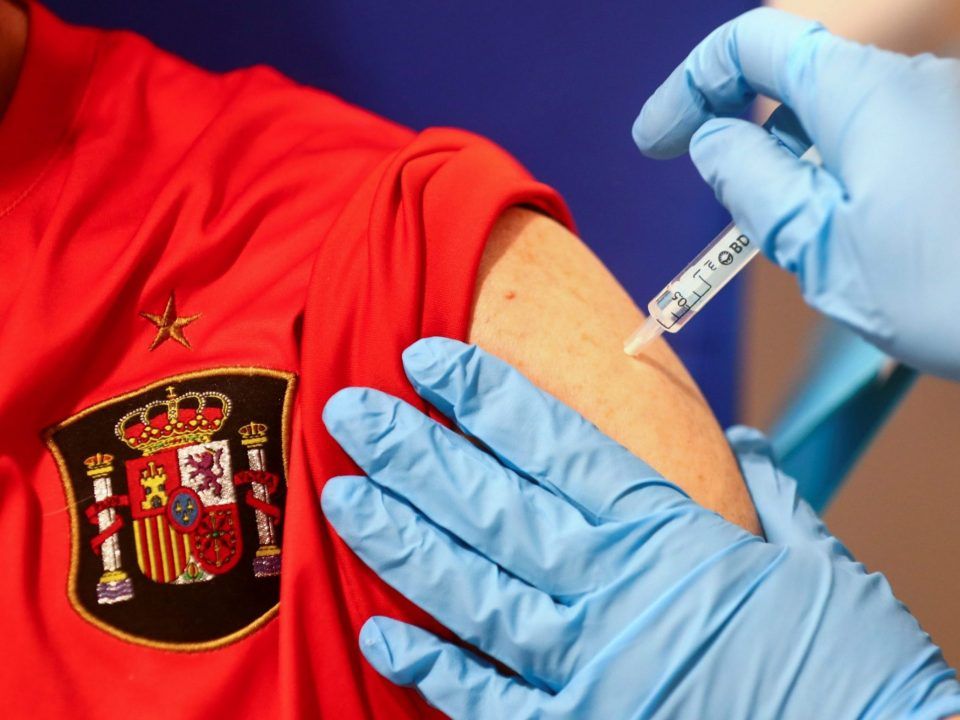
 torontosun.com
torontosun.com
Author of the article:Reuters
Reuters
Publishing date:Apr 06, 2021 • 1 day ago • 3 minute read • 14 Comments
A man, wearing a t-shirt with the logo of the Spanish National soccer team, receives his first dose of the AstraZeneca COVID-19 vaccine, at Enfermera Isabel Zendal hospital in Madrid, Spain, Tuesday, April 6, 2021.
A man, wearing a t-shirt with the logo of the Spanish National soccer team, receives his first dose of the AstraZeneca COVID-19 vaccine, at Enfermera Isabel Zendal hospital in Madrid, Spain, Tuesday, April 6, 2021. PHOTO BY SERGIO PEREZ /REUTERS
Article content
ROME — A senior official at Europe’s medicines regulator has said there is a clear “association” between AstraZeneca’s COVID-19 vaccine and very rare blood clots in the brain, though the direct cause of the clots is still unknown.
The European Medical Agency (EMA) said in a statement after the comments by Marco Cavaleri, chair of its vaccine evaluation team, that it was still conducting a review of the vaccine and expected to announce its findings on Wednesday or Thursday.
An AstraZeneca spokesman declined to comment on Cavaleri’s remarks, which he made in an interview with Italian newspaper Il Messagero that was published on Tuesday.
“In my opinion, we can now say it, it is clear that there is an association (of the brain blood clots) with the vaccine. However, we still do not know what causes this reaction,” Cavaleri said, without giving evidence to support his comments.
The EMA has said the benefits of the AstraZeneca shot outweigh any risks, and the World Health Organization has backed the vaccine. AstraZeneca has said previously that its studies have found no higher risk of clots because of its vaccine.
Advertisement
STORY CONTINUES BELOW
This advertisement has not loaded yet, but your article continues below.
Article content
The EMA is investigating 44 reports of an extremely rare brain clot known as cerebral venous sinus thrombosis (CVST) out of 9.2 million people who have received the vaccine in the European Economic Area, which comprises European Union member states and Iceland, Liechtenstein and Norway.
Cavaleri said the EMA would say in its review that there is a link, but was not likely to give an indication this week on which age groups should or should not get the AstraZeneca shot.
Some countries, including France, Germany and the Netherlands, have suspended the use of the vaccine in younger people while the investigations continue.
In response to Cavaleri’s comments, the Amsterdam-based EMA said in a statement on Tuesday: “EMA’s Pharmacovigilance Risk Assessment Committee (PRAC) has not yet reached a conclusion and the review (of any possible link) is currently ongoing.”
The EMA said last week that its review had not identified any specific risk factors, such as age, gender or medical history, for these very rare events.
In a separate interview, Armando Genazzani, a member of the EMA’s Committee for Medicinal Products for Human Use (CHMP), told La Stampa daily that it was “plausible” that the blood clots were correlated with the AstraZeneca vaccine.
A high proportion of the reported cases are in young or middle-aged women, but that has not led the EMA to conclude this group is at particular risk.
Scientists are exploring several possibilities that might explain the rare brain blood clots.
Advertisement
STORY CONTINUES BELOW
This advertisement has not loaded yet, but your article continues below.
Article content
One theory suggests the vaccine triggers an unusual antibody in some rare cases; other investigators are looking into a possible link with birth control pills.
But many experts say there is no definitive evidence and it is not clear whether or why AstraZeneca’s vaccine would cause a problem not shared by other vaccines that target a similar part of the coronavirus.
“We need to know more about the people affected and we need to understand exactly how the illnesses came about, while many other questions remain unanswered at this time,” said Adam Finn, a professor of pediatrics at Britain’s Bristol University who has been involved with UK studies of several COVID-19 vaccines, including the AstraZeneca shot and another developed by Pfizer.
He said it was very clear that clotting cases were “very rare indeed” and that the vaccines that are available and in use in Britain “prevent COVID very effectively.”

EMA official sees clear 'association' between AstraZeneca vaccine and rare blood clots in brain
ROME — A senior official at Europe’s medicines regulator has said there is a clear “association” between AstraZeneca’s COVID-19 vaccine and very rare blood clots in…
He said it was very clear that clotting cases were “very rare indeed” and that the vaccines that are available and in use in Britain “prevent COVID very effectively.”
VERIFY: Moderna, Pfizer vaccines may prevent disease, but not infection
The two vaccines are supposed to either stop or lessen disease. But, they may not stop the virus from getting into your body.Our Sources:
Dr. Chris Beyrer, an Infectious Disease expert and Dr. William Moss, a vaccines expert both work at Johns Hopkins University.
Our Process:
It sounds alarming at first, neither vaccine is aimed at preventing you from getting an infection.
“These COVID vaccines are preventing clinical disease, we don't know if they prevent transmission,” Dr. Beyrer said.
It’s important to know the difference between infection and disease. Dr. Moss said just because you are infected or have transmitted coronavirus doesn’t mean you get sick.
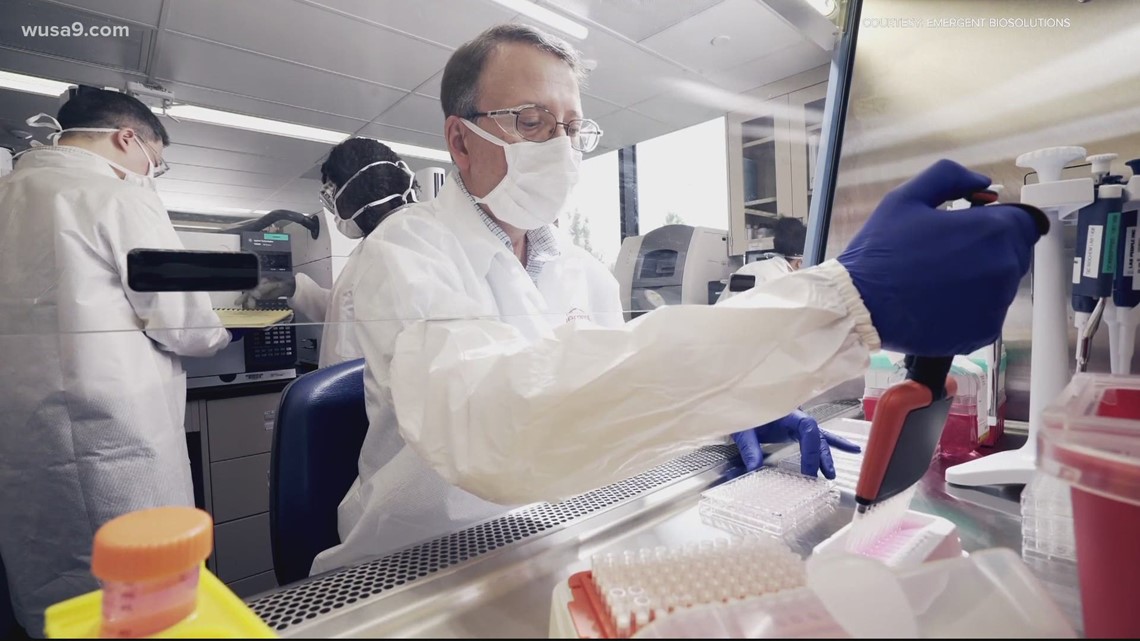
VERIFY: Moderna, Pfizer vaccines may prevent disease, but not infection
The two vaccines are supposed to either stop or lessen disease. But, they may not stop the virus from getting into your body.
"just because you are infected or have transmitted coronavirus doesn’t mean you get sick."
Oo
Riiiiiiiggggghhhhhtttttt........but, but, but, the PCR test!
EMA official sees clear 'association' between AstraZeneca vaccine and rare blood clots in brain
Author of the article:Reuters
Reuters
Publishing date:Apr 06, 2021 • 1 day ago • 3 minute read • 14 Comments
A man, wearing a t-shirt with the logo of the Spanish National soccer team, receives his first dose of the AstraZeneca COVID-19 vaccine, at Enfermera Isabel Zendal hospital in Madrid, Spain, Tuesday, April 6, 2021.
A man, wearing a t-shirt with the logo of the Spanish National soccer team, receives his first dose of the AstraZeneca COVID-19 vaccine, at Enfermera Isabel Zendal hospital in Madrid, Spain, Tuesday, April 6, 2021. PHOTO BY SERGIO PEREZ /REUTERS
Article content
ROME — A senior official at Europe’s medicines regulator has said there is a clear “association” between AstraZeneca’s COVID-19 vaccine and very rare blood clots in the brain, though the direct cause of the clots is still unknown.
The European Medical Agency (EMA) said in a statement after the comments by Marco Cavaleri, chair of its vaccine evaluation team, that it was still conducting a review of the vaccine and expected to announce its findings on Wednesday or Thursday.
An AstraZeneca spokesman declined to comment on Cavaleri’s remarks, which he made in an interview with Italian newspaper Il Messagero that was published on Tuesday.
“In my opinion, we can now say it, it is clear that there is an association (of the brain blood clots) with the vaccine. However, we still do not know what causes this reaction,” Cavaleri said, without giving evidence to support his comments.
The EMA has said the benefits of the AstraZeneca shot outweigh any risks, and the World Health Organization has backed the vaccine. AstraZeneca has said previously that its studies have found no higher risk of clots because of its vaccine.
Advertisement
STORY CONTINUES BELOW
This advertisement has not loaded yet, but your article continues below.
Article content
The EMA is investigating 44 reports of an extremely rare brain clot known as cerebral venous sinus thrombosis (CVST) out of 9.2 million people who have received the vaccine in the European Economic Area, which comprises European Union member states and Iceland, Liechtenstein and Norway.
Cavaleri said the EMA would say in its review that there is a link, but was not likely to give an indication this week on which age groups should or should not get the AstraZeneca shot.
Some countries, including France, Germany and the Netherlands, have suspended the use of the vaccine in younger people while the investigations continue.
In response to Cavaleri’s comments, the Amsterdam-based EMA said in a statement on Tuesday: “EMA’s Pharmacovigilance Risk Assessment Committee (PRAC) has not yet reached a conclusion and the review (of any possible link) is currently ongoing.”
The EMA said last week that its review had not identified any specific risk factors, such as age, gender or medical history, for these very rare events.
In a separate interview, Armando Genazzani, a member of the EMA’s Committee for Medicinal Products for Human Use (CHMP), told La Stampa daily that it was “plausible” that the blood clots were correlated with the AstraZeneca vaccine.
A high proportion of the reported cases are in young or middle-aged women, but that has not led the EMA to conclude this group is at particular risk.
Scientists are exploring several possibilities that might explain the rare brain blood clots.
Advertisement
STORY CONTINUES BELOW
This advertisement has not loaded yet, but your article continues below.
Article content
One theory suggests the vaccine triggers an unusual antibody in some rare cases; other investigators are looking into a possible link with birth control pills.
But many experts say there is no definitive evidence and it is not clear whether or why AstraZeneca’s vaccine would cause a problem not shared by other vaccines that target a similar part of the coronavirus.
“We need to know more about the people affected and we need to understand exactly how the illnesses came about, while many other questions remain unanswered at this time,” said Adam Finn, a professor of pediatrics at Britain’s Bristol University who has been involved with UK studies of several COVID-19 vaccines, including the AstraZeneca shot and another developed by Pfizer.
He said it was very clear that clotting cases were “very rare indeed” and that the vaccines that are available and in use in Britain “prevent COVID very effectively.”

EMA official sees clear 'association' between AstraZeneca vaccine and rare blood clots in brain
ROME — A senior official at Europe’s medicines regulator has said there is a clear “association” between AstraZeneca’s COVID-19 vaccine and very rare blood clots in…torontosun.com

Coronavirus: AstraZeneca jab “as risky as taking a long-haul flight” says Matt Hancock | 5 News
Booming market for fake COVID-19 vaccine passports sparks alarm
Author of the article:Reuters
Reuters
Umberto Bacchi, Thomson Reuters Foundation
Publishing date:Apr 08, 2021 • 6 hours ago • 2 minute read • Join the conversation
A passenger walks in a terminal of the Franz-Josef-Strauss airport in Munich, southern Germany, on April 8, 2021, amid the ongoing COVID-19 pandemic.
A passenger walks in a terminal of the Franz-Josef-Strauss airport in Munich, southern Germany, on April 8, 2021, amid the ongoing COVID-19 pandemic. PHOTO BY CHRISTOF STACHE /AFP via Getty Images
Article content
Fake coronavirus vaccine passports are being sold online for “peanuts” in a fast-growing scam that has alarmed authorities as countries bet on the documents to revive travel and their economies, cyber security experts said.
From Iceland to Israel, a number of countries have started to lift lockdown restrictions for people who can prove they have been vaccinated – letting them visit leisure venues or cross borders if they show vaccine papers.
“People are trying to circumvent that by creating false documents, essentially putting the lives of others at risk,” Beenu Arora, founder of cyber intelligence firm Cyble, told the Thomson Reuters Foundation in an online interview.
“We’ve seen hundreds of websites on the dark web where these documents are being sold … at the price of peanuts” he said.
The dark web is a part of the internet that lies beyond the reach of search engines, where users are largely anonymous and mainly pay with cryptocurrencies such as bitcoin.
Advertisement
STORY CONTINUES BELOW
This advertisement has not loaded yet, but your article continues below.
Article content
Fake vaccination papers can be bought for as little as $12, Arora said, adding that the number of listings had mushroomed since the first started appearing in late February.
Oded Vanunu of cyber-security company Check Point said researchers at the firm had found numerous dark web adverts offering documents purportedly issued in the United States, Russia and other countries.
“There’s a big demand for it,” he said.
Forgeries have also appeared on regular websites and e-commerce platforms, said Chad Anderson, a senior security researcher at online threat intelligence firm DomainTools.
Last week, 45 attorney generals from the United States signed a letter calling on the heads of Twitter, eBay and Shopify to take immediate action to prevent their platforms from being used to sell fraudulent COVID-19 vaccine cards.
“The false and deceptive marketing and sales of fake COVID vaccine cards threatens the health of our communities, slows progress in getting our residents protected from the virus, and are a violation of the laws of many states,” it read.
EBay said it was taking significant measures to block or quickly remove items that made false health claims including vaccine cards.
Twitter said the sale of fake COVID-19 cards was not permitted on the site and it took “enforcement action” when violations were identified. Shopify did not immediately reply to a request for comment.
Days earlier, the FBI urged people not to post photos of their vaccination cards on social media, warning that the information could be used by scammers to forge documents.
Advertisement
STORY CONTINUES BELOW
This advertisement has not loaded yet, but your article continues below.
Article content
Anderson of DomainTools said forging paper documents had become “so easy” nowadays.
“It’s trivial, especially with the editing tools that we have today,” he said.
Vanunu said that to make forgery more difficult vaccination cards should be digitally signed with encrypted keys using a QR code system similar to that adopted in Israel.
Once scanned, the codes would reveal vaccine information as well as the name of the holder – to be checked against identity documents. But to work for international travel, such a system would require countries to share data, he said.
China, Bahrain and a few other nations have already introduced vaccine passports, with South Korea and the European Union also announcing plans for digital documents.
But the concept has faced strong opposition in other countries, including Britain, where more than 70 lawmakers described the idea as “divisive and discriminatory.”
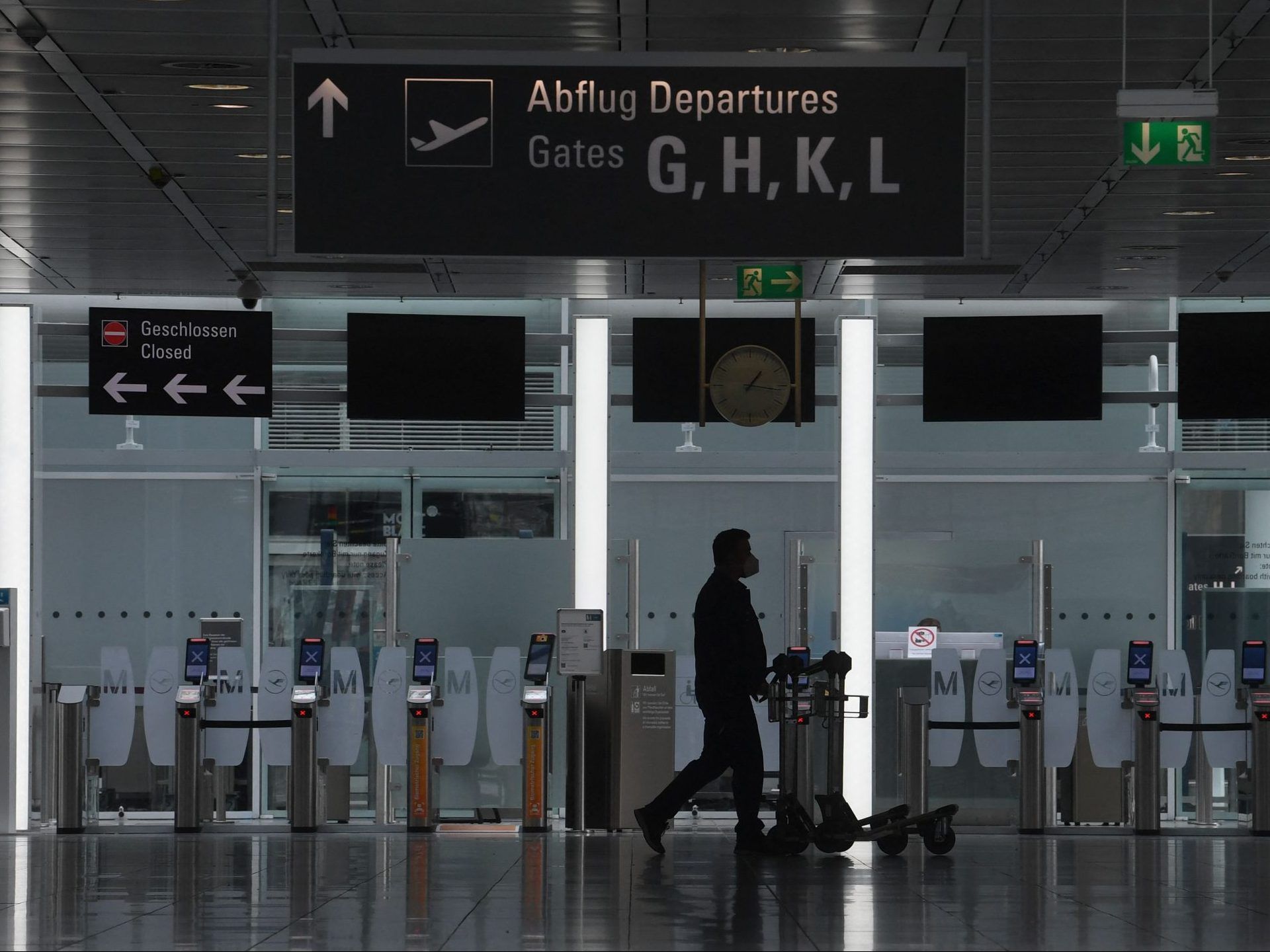
 torontosun.com
torontosun.com
Author of the article:Reuters
Reuters
Umberto Bacchi, Thomson Reuters Foundation
Publishing date:Apr 08, 2021 • 6 hours ago • 2 minute read • Join the conversation
A passenger walks in a terminal of the Franz-Josef-Strauss airport in Munich, southern Germany, on April 8, 2021, amid the ongoing COVID-19 pandemic.
A passenger walks in a terminal of the Franz-Josef-Strauss airport in Munich, southern Germany, on April 8, 2021, amid the ongoing COVID-19 pandemic. PHOTO BY CHRISTOF STACHE /AFP via Getty Images
Article content
Fake coronavirus vaccine passports are being sold online for “peanuts” in a fast-growing scam that has alarmed authorities as countries bet on the documents to revive travel and their economies, cyber security experts said.
From Iceland to Israel, a number of countries have started to lift lockdown restrictions for people who can prove they have been vaccinated – letting them visit leisure venues or cross borders if they show vaccine papers.
“People are trying to circumvent that by creating false documents, essentially putting the lives of others at risk,” Beenu Arora, founder of cyber intelligence firm Cyble, told the Thomson Reuters Foundation in an online interview.
“We’ve seen hundreds of websites on the dark web where these documents are being sold … at the price of peanuts” he said.
The dark web is a part of the internet that lies beyond the reach of search engines, where users are largely anonymous and mainly pay with cryptocurrencies such as bitcoin.
Advertisement
STORY CONTINUES BELOW
This advertisement has not loaded yet, but your article continues below.
Article content
Fake vaccination papers can be bought for as little as $12, Arora said, adding that the number of listings had mushroomed since the first started appearing in late February.
Oded Vanunu of cyber-security company Check Point said researchers at the firm had found numerous dark web adverts offering documents purportedly issued in the United States, Russia and other countries.
“There’s a big demand for it,” he said.
Forgeries have also appeared on regular websites and e-commerce platforms, said Chad Anderson, a senior security researcher at online threat intelligence firm DomainTools.
Last week, 45 attorney generals from the United States signed a letter calling on the heads of Twitter, eBay and Shopify to take immediate action to prevent their platforms from being used to sell fraudulent COVID-19 vaccine cards.
“The false and deceptive marketing and sales of fake COVID vaccine cards threatens the health of our communities, slows progress in getting our residents protected from the virus, and are a violation of the laws of many states,” it read.
EBay said it was taking significant measures to block or quickly remove items that made false health claims including vaccine cards.
Twitter said the sale of fake COVID-19 cards was not permitted on the site and it took “enforcement action” when violations were identified. Shopify did not immediately reply to a request for comment.
Days earlier, the FBI urged people not to post photos of their vaccination cards on social media, warning that the information could be used by scammers to forge documents.
Advertisement
STORY CONTINUES BELOW
This advertisement has not loaded yet, but your article continues below.
Article content
Anderson of DomainTools said forging paper documents had become “so easy” nowadays.
“It’s trivial, especially with the editing tools that we have today,” he said.
Vanunu said that to make forgery more difficult vaccination cards should be digitally signed with encrypted keys using a QR code system similar to that adopted in Israel.
Once scanned, the codes would reveal vaccine information as well as the name of the holder – to be checked against identity documents. But to work for international travel, such a system would require countries to share data, he said.
China, Bahrain and a few other nations have already introduced vaccine passports, with South Korea and the European Union also announcing plans for digital documents.
But the concept has faced strong opposition in other countries, including Britain, where more than 70 lawmakers described the idea as “divisive and discriminatory.”

Booming market for fake COVID-19 vaccine passports sparks alarm
Fake coronavirus vaccine passports are being sold online for “peanuts” in a fast-growing scam that has alarmed authorities as countries bet on the documents to revi…
Swiss students in hot water after COVID-19 hoax led to quarantine
Author of the article:Reuters
Reuters
Publishing date:Apr 08, 2021 • 13 hours ago • 1 minute read • Join the conversation
Tube tests are pictured pictured as media visit the Microbiology Laboratory of the University Hospital (CHUV) during the COVID-19 outbreak in Lausanne, Switzerland, March 23, 2020.
Tube tests are pictured pictured as media visit the Microbiology Laboratory of the University Hospital (CHUV) during the COVID-19 outbreak in Lausanne, Switzerland, March 23, 2020. PHOTO BY DENIS BALIBOUSE /REUTERS
Article content
ZURICH — Students in the Swiss city of Basel falsified positive COVID-19 results in a bid to skip school, resulting in the entire class being put in quarantine, and now disciplinary measures against the perpetrators after the hoax was discovered.
Three students in Basel’s Kirschgarten High School falsified SMS messages from Switzerland’s COVID-19 contact tracing app, the Swiss newspaper Blick reported.
That forced about 25 classmates to be confined to their homes for some 10 days. Several teachers were also affected by the incident just before spring break in March.
“This is not just a childish prank, this is a serious incident,” Simon Thiriet, a spokesman for Basel’s education department, told Blick.
The school plans to pursue criminal charges for falsifying “health-relevant documents” though it does not plan to expel them. Thiriet said that students are in a “difficult situation” due to the pandemic, but that doesn’t excuse the threesome’s stunt.
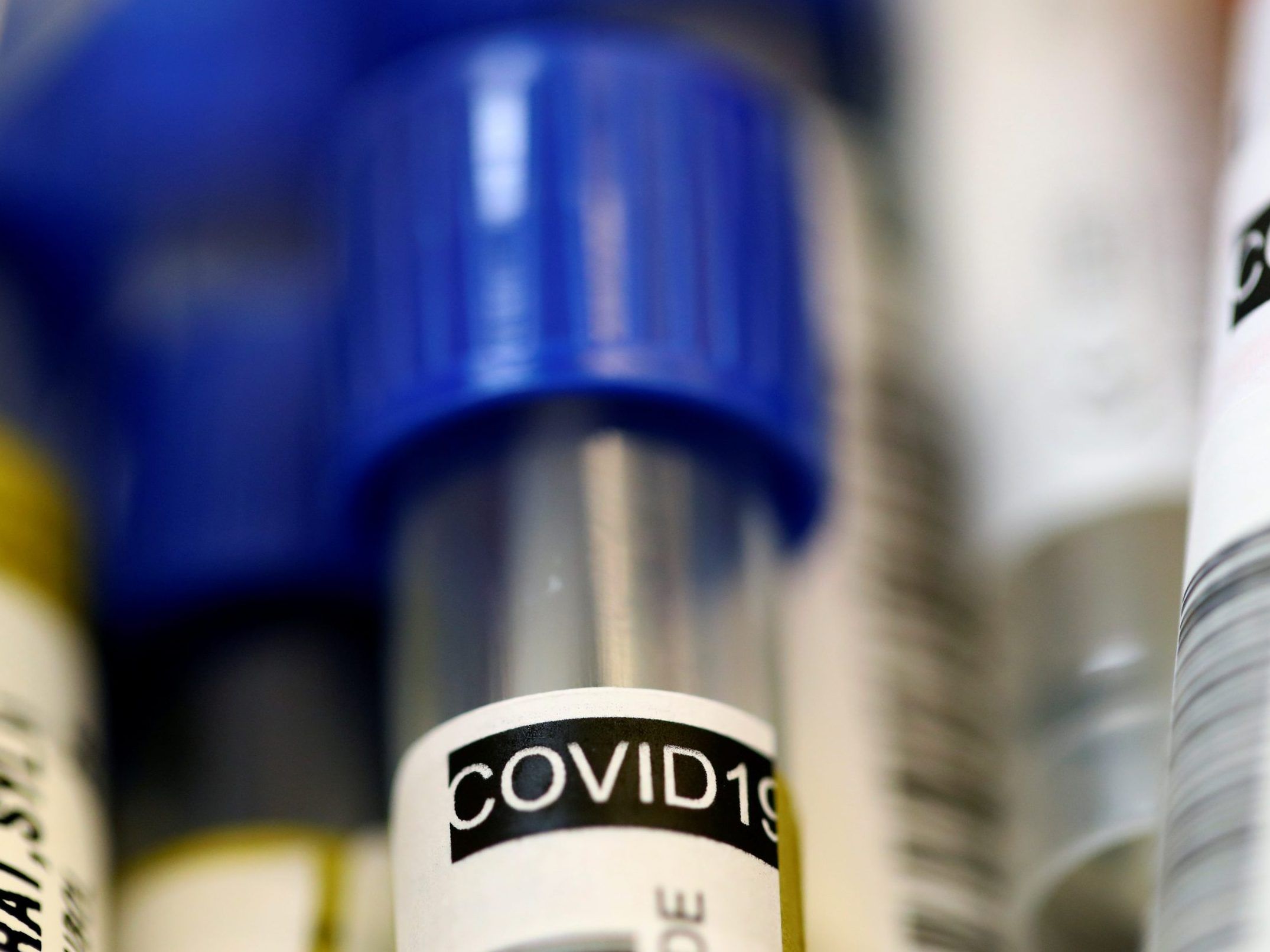
 torontosun.com
torontosun.com
Author of the article:Reuters
Reuters
Publishing date:Apr 08, 2021 • 13 hours ago • 1 minute read • Join the conversation
Tube tests are pictured pictured as media visit the Microbiology Laboratory of the University Hospital (CHUV) during the COVID-19 outbreak in Lausanne, Switzerland, March 23, 2020.
Tube tests are pictured pictured as media visit the Microbiology Laboratory of the University Hospital (CHUV) during the COVID-19 outbreak in Lausanne, Switzerland, March 23, 2020. PHOTO BY DENIS BALIBOUSE /REUTERS
Article content
ZURICH — Students in the Swiss city of Basel falsified positive COVID-19 results in a bid to skip school, resulting in the entire class being put in quarantine, and now disciplinary measures against the perpetrators after the hoax was discovered.
Three students in Basel’s Kirschgarten High School falsified SMS messages from Switzerland’s COVID-19 contact tracing app, the Swiss newspaper Blick reported.
That forced about 25 classmates to be confined to their homes for some 10 days. Several teachers were also affected by the incident just before spring break in March.
“This is not just a childish prank, this is a serious incident,” Simon Thiriet, a spokesman for Basel’s education department, told Blick.
The school plans to pursue criminal charges for falsifying “health-relevant documents” though it does not plan to expel them. Thiriet said that students are in a “difficult situation” due to the pandemic, but that doesn’t excuse the threesome’s stunt.

Swiss students in hot water after COVID-19 hoax led to quarantine
ZURICH — Students in the Swiss city of Basel falsified positive COVID-19 results in a bid to skip school, resulting in the entire class being put in quarantine, and…
AstraZeneca woes grow as Australia, Philippines, African Union curb COVID-19 shots
Author of the article:Reuters
Reuters
Publishing date:Apr 08, 2021 • 7 hours ago • 3 minute read • Join the conversation
A pharmacist holds a vial of the AstraZeneca COVID-19 vaccine in a pharmacy in Roubaix as part of the coronavirus disease (COVID-19) vaccination campaign in France, March 15, 2021.
A pharmacist holds a vial of the AstraZeneca COVID-19 vaccine in a pharmacy in Roubaix as part of the coronavirus disease (COVID-19) vaccination campaign in France, March 15, 2021. PHOTO BY PASCAL ROSSIGNOL /REUTERS
Article content
Australia and the Philippines limited use of AstraZeneca’s COVID-19 vaccine on Thursday, while the African Union dropped plans to buy the shot amid global shortages, dealing further blows to the company’s hopes to deliver a vaccine for the world.
The vaccine – developed with Oxford University and considered a frontrunner in the global vaccine race – has been plagued by safety concerns and supply problems since Phase III trial results were published in December, with Indonesia the latest country forced to seek doses from other drugmakers.
The Philippines suspended the use of AstraZeneca shots for people under age 60 after Europe’s regulator said on Wednesday it found rare cases of blood clots among some adult recipients, although it still believes that the vaccine’s benefits outweighed its risks.
Australia recommended people under 50 should get Pfizer’s COVID-19 vaccine in preference to AstraZeneca’s, a policy shift it warned would hold up its inoculation campaign.
Advertisement
STORY CONTINUES BELOW
This advertisement has not loaded yet, but your article continues below.
Article content
AstraZeneca’s shot is sold at cost, for a few dollars a dose. It is by far the cheapest and most high-volume launched so far, and has none of the extreme refrigeration requirements of some other COVID-19 vaccines, making it likely to be the mainstay of many inoculation programs in the developing world.
But more than a dozen countries have at one time suspended or partially suspended use of the shot, first on concerns about efficacy in older people, and now on worries about rare dangerous side effects in younger people.
That, coupled with production setbacks, will delay the rollout of vaccines across the globe as governments scramble to find alternatives to tame the pandemic that has killed more than 3 million.
‘EXTREMELY RARE’
Italy on Wednesday joined France, the Netherlands, Germany and others in recommending a minimum age for recipients of AstraZeneca’s shot, and Britain said people under 30 should get an alternative. South Korea also suspended use of the vaccine in people under 60 this week, while approving Johnson & Johnson’s one-dose vaccine.
AstraZeneca has said it is working with British and European regulators to list possible brain blood clots as “an extremely rare potential side-effect.”
South Africa also paused AstraZeneca vaccinations last month after a small trial showed the shot offered minimal protection against mild-to-moderate illness caused by the dominant local coronavirus variant.
AstraZeneca is grappling with production issues that have led to shortfalls of its vaccine in several countries.
Advertisement
STORY CONTINUES BELOW
This advertisement has not loaded yet, but your article continues below.
Article content
Indonesian Health Minister Budi Gunadi Sadikin said on Thursday the country was in talks with China on getting as many as 100 million COVID-19 vaccine doses to plug a gap in deliveries caused by delays in the arrival of AstraZeneca shots.
India has put a temporary hold on all major exports of AstraZeneca’s shot made by the Serum Institute of India (SII), the world’s biggest vaccine-maker, as domestic infections rise.
That has affected supplies to the GAVI/WHO-backed global COVAX vaccine-sharing facility through which 64 poorer countries are supposed to get doses from SII, the programme’s procurement and distributing partner UNICEF told Reuters last month.
GAVI and the World Health Organization said in a statement on Thursday that the facility had delivered nearly 38.4 million doses to more than 100 countries and economies across six continents, and expects to deliver doses to all participating economies that requested vaccines in the first half of the year.
AstraZeneca Chief Executive Pascal Soriot was quoted in the statement as saying more than 37 million doses of the company’s vaccine had been delivered through COVAX.
“We continue to work 24/7 to deliver on our unwavering commitment to broad, equitable and affordable access,” he said.
The African Union is exploring vaccine options with Johnson & Johnson, the head of the Africa Centres for Disease Control and Prevention said. It dropped plans to buy AstraZeneca’s shot from SII to avoid duplicating efforts by COVAX, which will continue to supply the vaccine to Africa.
Britain is slowing its vaccine rollout due to delays in a shipment of AstraZeneca shots from India and is at loggerheads with the EU over exports of the vaccine. Australia has also blamed delays in its immunization campaign on supply issues in Europe.
AstraZeneca has cited reduced yields at a European factory for the supply shortfall to the European Union.
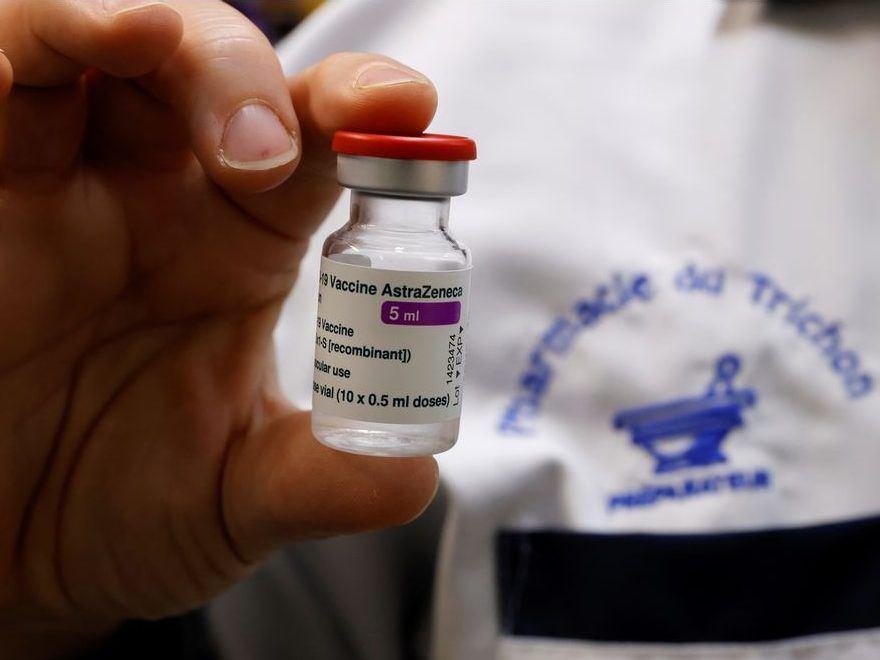
 torontosun.com
torontosun.com
Author of the article:Reuters
Reuters
Publishing date:Apr 08, 2021 • 7 hours ago • 3 minute read • Join the conversation
A pharmacist holds a vial of the AstraZeneca COVID-19 vaccine in a pharmacy in Roubaix as part of the coronavirus disease (COVID-19) vaccination campaign in France, March 15, 2021.
A pharmacist holds a vial of the AstraZeneca COVID-19 vaccine in a pharmacy in Roubaix as part of the coronavirus disease (COVID-19) vaccination campaign in France, March 15, 2021. PHOTO BY PASCAL ROSSIGNOL /REUTERS
Article content
Australia and the Philippines limited use of AstraZeneca’s COVID-19 vaccine on Thursday, while the African Union dropped plans to buy the shot amid global shortages, dealing further blows to the company’s hopes to deliver a vaccine for the world.
The vaccine – developed with Oxford University and considered a frontrunner in the global vaccine race – has been plagued by safety concerns and supply problems since Phase III trial results were published in December, with Indonesia the latest country forced to seek doses from other drugmakers.
The Philippines suspended the use of AstraZeneca shots for people under age 60 after Europe’s regulator said on Wednesday it found rare cases of blood clots among some adult recipients, although it still believes that the vaccine’s benefits outweighed its risks.
Australia recommended people under 50 should get Pfizer’s COVID-19 vaccine in preference to AstraZeneca’s, a policy shift it warned would hold up its inoculation campaign.
Advertisement
STORY CONTINUES BELOW
This advertisement has not loaded yet, but your article continues below.
Article content
AstraZeneca’s shot is sold at cost, for a few dollars a dose. It is by far the cheapest and most high-volume launched so far, and has none of the extreme refrigeration requirements of some other COVID-19 vaccines, making it likely to be the mainstay of many inoculation programs in the developing world.
But more than a dozen countries have at one time suspended or partially suspended use of the shot, first on concerns about efficacy in older people, and now on worries about rare dangerous side effects in younger people.
That, coupled with production setbacks, will delay the rollout of vaccines across the globe as governments scramble to find alternatives to tame the pandemic that has killed more than 3 million.
‘EXTREMELY RARE’
Italy on Wednesday joined France, the Netherlands, Germany and others in recommending a minimum age for recipients of AstraZeneca’s shot, and Britain said people under 30 should get an alternative. South Korea also suspended use of the vaccine in people under 60 this week, while approving Johnson & Johnson’s one-dose vaccine.
AstraZeneca has said it is working with British and European regulators to list possible brain blood clots as “an extremely rare potential side-effect.”
South Africa also paused AstraZeneca vaccinations last month after a small trial showed the shot offered minimal protection against mild-to-moderate illness caused by the dominant local coronavirus variant.
AstraZeneca is grappling with production issues that have led to shortfalls of its vaccine in several countries.
Advertisement
STORY CONTINUES BELOW
This advertisement has not loaded yet, but your article continues below.
Article content
Indonesian Health Minister Budi Gunadi Sadikin said on Thursday the country was in talks with China on getting as many as 100 million COVID-19 vaccine doses to plug a gap in deliveries caused by delays in the arrival of AstraZeneca shots.
India has put a temporary hold on all major exports of AstraZeneca’s shot made by the Serum Institute of India (SII), the world’s biggest vaccine-maker, as domestic infections rise.
That has affected supplies to the GAVI/WHO-backed global COVAX vaccine-sharing facility through which 64 poorer countries are supposed to get doses from SII, the programme’s procurement and distributing partner UNICEF told Reuters last month.
GAVI and the World Health Organization said in a statement on Thursday that the facility had delivered nearly 38.4 million doses to more than 100 countries and economies across six continents, and expects to deliver doses to all participating economies that requested vaccines in the first half of the year.
AstraZeneca Chief Executive Pascal Soriot was quoted in the statement as saying more than 37 million doses of the company’s vaccine had been delivered through COVAX.
“We continue to work 24/7 to deliver on our unwavering commitment to broad, equitable and affordable access,” he said.
The African Union is exploring vaccine options with Johnson & Johnson, the head of the Africa Centres for Disease Control and Prevention said. It dropped plans to buy AstraZeneca’s shot from SII to avoid duplicating efforts by COVAX, which will continue to supply the vaccine to Africa.
Britain is slowing its vaccine rollout due to delays in a shipment of AstraZeneca shots from India and is at loggerheads with the EU over exports of the vaccine. Australia has also blamed delays in its immunization campaign on supply issues in Europe.
AstraZeneca has cited reduced yields at a European factory for the supply shortfall to the European Union.

AstraZeneca woes grow as Australia, Philippines, African Union curb COVID-19 shots
Australia and the Philippines limited use of AstraZeneca’s COVID-19 vaccine on Thursday, while the African Union dropped plans to buy the shot amid global shortages…

